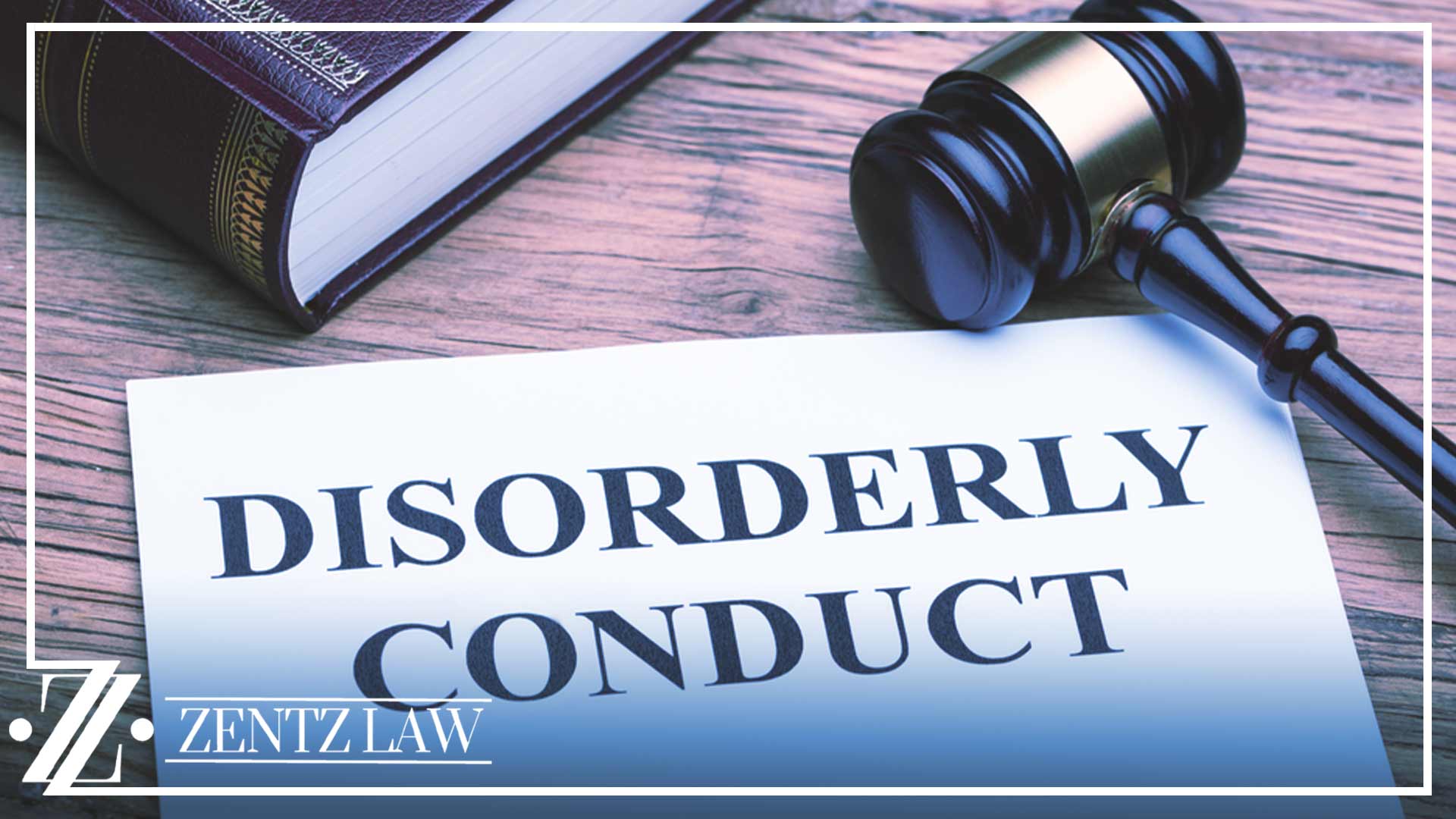Disorderly Conduct Attorney
When Do You Need a Disorderly Conduct Attorney in Indiana?


Zentz Law is home to trusted Indiana criminal defense lawyers who have spent decades defending clients from disorderly conduct charges. Each Indiana disorderly conduct lawyer in our firm can help you navigate Indiana’s complex disorderly conduct laws.
If you’ve been charged with disorderly conduct, our firm of criminal defense lawyers is here to help. Call us at (317) 678-9463 and we may be able to help mitigate consequences, reduce potential fines, and avoid jail time.
How Zentz Law Indiana Disorderly Conduct Attorney Can Help
Zentz Law criminal defense lawyers have been successfully defending clients for years. We understand the nuances of criminal law and the intricacies of the legal system. This allows us to craft personalized defense strategies to fight a disorderly conduct charge or public intoxication conviction.
Our experienced disorderly conduct attorneys offer customized assistance for each person, addressing their unique circumstances. A Zentz Law Indiana disorderly conduct lawyer will analyze your case, provide expert legal advice, and fight for the most favorable outcome.
What Is the Legal Definition of Disorderly Conduct?
The Indiana legislature has outlined a comprehensive definition of disorderly conduct.
According to Indiana Code § 35-45-1-3, an individual can be charged with disorderly conduct offenses if a person recklessly knowingly or intentionally:
- Engage in fighting or tumultuous conduct, as defined in Indiana Code § 35-45-1-1, which encompasses behavior likely to cause serious bodily injury to a person or substantial property damage;
- Persist in making unreasonable noise after being requested to cease or
- Disrupt a lawful assembly of individuals.
Any time disorderly conduct adversely affects those around you and meets the definition above, there’s a genuine risk you’ll face a disorderly conduct charge, fine, and possibly jail time.
What Is Tumultuous Conduct Under Indiana Law?
Indiana defines “tumultuous conduct” as a person acting or behaving in a way that recklessly, knowingly, or intentionally harms people or inflicts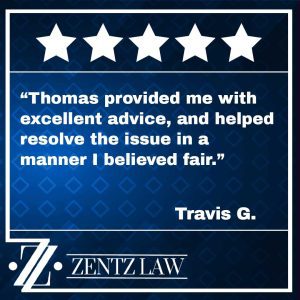

That being said, tumultuous conduct is heightened chaos, disorder, and potential danger threatening another person or public health. It’s when conduct adversely affects others and, if left unchecked, could lead to serious bodily injury or damage to property.
The Indiana Supreme Court states the defendant’s physical actions must present a significant risk of severe bodily injury or substantial property damage.
The statute provides a framework for defining when conduct adversely affects public health and public order. It establishes Class B misdemeanor charges, fines, and jail time as severe penalties for a person convicted of a tumultuous conduct crime.
What Constitutes Unlawful Assembly in Indiana?
Indiana law defines unlawful assembly as a gathering involving five or more individuals who plan to engage in illegal conduct. It’s a misdemeanor crime that can include gathering to disrupt things like a funeral procession or knowingly or intentionally obstructing police matters.
The law creates serious penalties for individuals who gather and undermine public order and safety.
Offenses can lead to jail time and fees unless insufficient evidence proves the gathering was anything other than a lawful.
How Does Indiana Define Unreasonable Noise?


To establish disorderly conduct based on unreasonable noise, a prosecutor must demonstrate the noise level exceeded what was appropriate for the circumstances.
Indiana Supreme Court also has established that the content of the message is immaterial; what matters is that the person makes unreasonable noise that disrupts the peace and order of the environment.
It’s not recommended that any person fights an unreasonable noise charge without legal representation. It can be challenging to determine what is reasonable for the context where the person committed the alleged crime and establish whether they committed a crime warranting disorderly conduct convictions.
What Are the Potential Consequences of a Disorderly Conduct Conviction Under Indiana Law?
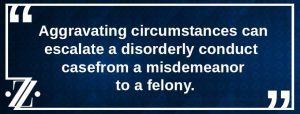

Disorderly conduct is a Class B misdemeanor carrying potential penalties of up to 180 days in jail and a fine of up to $1,000 for each incident of disorderly conduct committed.
Extenuating (or aggravating) circumstances can escalate the case from a misdemeanor to a felony. Under Indiana law, disorderly conduct charges may be elevated to a Level 6 felony, punishable by a prison term ranging from six months to three years and a fine not surpassing $10,000.
What Are Aggravating Factors Related to Disorderly Conduct?
Under Indiana Code § 35-50-2-7, two specific circumstances escalate a disorderly conduct crime from a Class B misdemeanor to a felony:
- The disorderly conduct offenses occur on airport premises. This can include a parking area, maintenance bay, or aircraft hangar, adversely affecting airport security.
- The disorderly conduct occurred within 500 feet of a burial site, during a funeral procession, or within a building hosting the service. The conduct adversely impact the burial, funeral or memorial service, viewing, or funeral procession of the deceased person.
In addition to increased jail time and fines, having a felony conviction on your criminal record severely limits your ability to work, vote, and possess firearms.
What If I’m Charged With Disorderly Conduct But It Was Self-Defense?
Claiming self-defense can be a viable strategy for beating a disorderly conduct charge. This is especially true if the defendant can demonstrate that their actions were necessary to protect themselves or others.
For example, if you were accused of disorderly conduct after being attacked in a dark parking area or while working in an isolated maintenance bay, you may be able to prove you fought back to save your own life.
If a person can prove their behavior was a reasonable response to a perceived threat, defendants may be able to show the conduct was justified. You may be able to file a lawsuit for damages against your attacker or the owner of the unsafe parking area or maintenance bay.
Successfully invoking self-defense in a disorderly conduct case requires skilled legal representation to present a compelling defense.
Presenting a Free Speech Defense When Charged With Making Unreasonable Noise
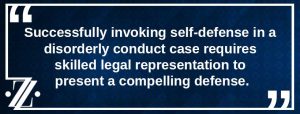

However, freedom of speech doesn’t mean you can say anything at any time. The Constitution does not permit things that are potentially harmful to others. There’s a fine line between exercising free speech and violating federal, state, and local laws.
How Zentz Law Can Help
From the moment you reach out to us, you’ll receive personalized attention and dedicated support. We’ll take the time to listen to your side of the story. We will thoroughly investigate the circumstances surrounding your arrest, and identify any potential weaknesses in the prosecution’s case.
We are here to help with disorderly conduct charges, verbal altercations, public intoxication, conduct that threatens airport security, or other disruptive behavior. We’ll explore all available legal options and negotiate with prosecutors on your behalf.
An Indianapolis criminal attorney from Zentz Law will determine if sufficient evidence exists to prove a disorderly conduct charge.
Here are a few key ways our attorneys will support you during your case:
Thorough Examination of Evidence: Gather, examine, and identify any weaknesses, inconsistencies, or potential violations of the client’s rights.
Establishing Innocence or Lack of Intent: Make an exhaustive effort to show insufficient proof to prove or absence of intent to commit disorderly conduct. This may involve presenting alibis, witness testimony, security footage, or expert testimony of the client’s behavior during the alleged offense.
Asserting First Amendment Protections: Vigorously advocate for protecting the client’s First Amendment rights. This is particularly true in cases where disorderly conduct charges stem from activities such as peaceful protests.
Strategic Negotiation with Prosecution: The attorney negotiates with the prosecution to pursue favorable outcomes for the client. This may include reduced charges or alternative sentencing options.
Leveraging Mental Health or Intoxication Defenses: Present compelling arguments regarding the influence of mental health issues or public intoxication on the client’s behavior. They highlight any mitigating factors that may have contributed to the alleged conduct.
Aggressive Pursuit of Pretrial Motions: File pretrial motions to suppress evidence or dismiss charges. They leverage legal precedents and procedural rules to challenge the prosecution’s case and protect the client’s rights.
Thorough Trial Preparation and Presentation: Prepare for trial by strategically selecting jurors, skillfully cross-examining witnesses, and presenting persuasive arguments to maximize the chances of a favorable outcome.
An experienced attorney will effectively defend their client against public intoxication and disorderly conduct charges. They will challenge each aspect of the prosecution’s case.


The Legal Process After You’ve Been Charged With Disorderly Conduct
Arrest
- Initial Arrest and Charges: If you are charged with disorderly conduct, you will undergo the standard arrest procedure.
- Arraignment: At your disorderly conduct arraignment, you’ll appear before a judge to enter a plea of guilty, not guilty, or no contest. It’s crucial to have legal representation to advocate for your rights and ensure a proper understanding of the charges.
- Discovery: Both the prosecution and defense exchange evidence and information relevant to the disorderly conduct case. Then, your attorney will review everything presented and strategize accordingly.
Pretrial
- Pretrial Motions: Your attorney may file motions to suppress evidence, dismiss charges, or address any legal issues that could affect the case outcome.
- Plea Bargaining: There may be opportunities for plea negotiations between your attorney and the prosecution. This could involve seeking reduced charges or penalties for disorderly conduct in exchange for a guilty plea.
- Pretrial Conference: A meeting between the judge, prosecution, and defense to discuss the case status, potential plea agreements, and trial readiness.
- Trial Preparation: Your disorderly conduct attorney will prepare you for trial by reviewing courtroom procedures, discussing potential strategies, and determining the best approach for your defense.
- Jury Selection: If your case goes to trial, a jury will be selected to hear both sides and render a verdict. Your attorney will play a crucial role in selecting fair and impartial jurors.
Trial
- Trial: During the trial, your attorney will present your side of the story. This includes cross-examining witnesses and making arguments to persuade the judge or jury of your innocence or reasonable doubt.
- Verdict and Sentencing: If the jury chooses conviction, the judge will impose a sentence, including fines, probation, community service, or jail time. Your attorney may advocate for a lenient sentence based on mitigating factors.

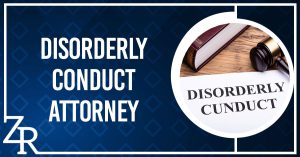
- Appeals: If you are convicted and believe that errors during the trial affected the outcome, your attorney may file an appeal to challenge the verdict or sentence.
Throughout this process, your disorderly conduct attorney will be fighting for your rights and advocating for the best possible outcome. They’ll provide expert guidance, advise you on your legal options, and work diligently to defend your case.
Understanding your rights and legal options is crucial when charged with disorderly conduct or public intoxication if you want to avoid conviction, fines, and jail time.
If Charged With Disorderly Conduct, Don’t Wait, Take These Steps
If you’ve been arrested for disorderly conduct in Indiana, here are the steps you should take:
- Remain Calm: Stay composed and avoid escalating the situation further by arguing or assaulting police officers.
- Cooperate with Law Enforcement: Follow instructions from sheriffs and police officers and comply with their requests. Fighting back will only add more charges and decrease the chance of getting the charges dismissed.
- Invoke Your Right to Remain Silent: You can remain silent and not incriminate yourself. No one can force you to speak to a police officer. Exercise this right until you have legal representation.
- Request Legal Representation: Ask for an Indiana disorderly conduct lawyer immediately. Your attorney will provide guidance and represent your interests throughout the legal process.
- Gather Information: Note details surrounding your arrest, including the location, time, and circumstances leading to it. Collect contact information for witnesses present because they can be essential to your defense.
- Avoid Making Statements: Do not discuss the incident with anyone other than your disorderly conduct lawyer. Statements made to law enforcement or others could be used against you in court.
- Appear for Arraignment: Attend your arraignment as scheduled and plead not guilty. If you have a disorderly conduct lawyer, they will represent you during this proceeding.
- Follow Legal Counsel’s Advice: Listen to your attorney’s guidance and follow their advice throughout the legal proceedings.
- Prepare for Your Defense: Work closely with your Indiana disorderly conduct lawyer to prepare a defense strategy. Provide any relevant information or evidence that could support your case.
- Attend Court Proceedings: You are required to attend all court hearings and proceedings. Your presence is crucial to your defense and demonstrates respect for the legal process.
By taking these steps, you can protect your rights and improve your chances of achieving a favorable outcome.
Secure An Indiana Disorderly Conduct Attorney Who Will Fight For You
The legal team at Zentz Law comprises seasoned criminal defense attorneys adept at investigating cases and devising effective defense strategies.
Those facing disorderly conduct charges in Indianapolis can contact Zentz Law at (317) 678-9463 or submit a request form for prompt assistance.


